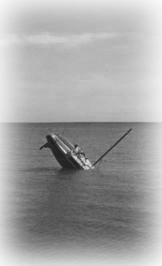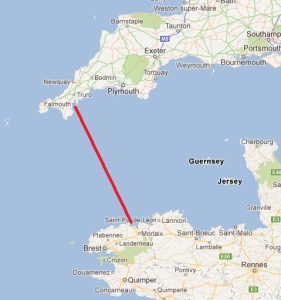Three hours astern, fifteen hours ahead,
a few minutes straight down.
Landfall is always closer than you think.
 I have written that over my first 3000 nautical miles of sailing nothing interesting, noteworthy or dramatic has ever happened. I’ve also written that, in a generally boring and predictable life, regular adventure and excitement requires contrivance, exaggeration, extraordinary bad luck, or a healthy dose of incompetence.
I have written that over my first 3000 nautical miles of sailing nothing interesting, noteworthy or dramatic has ever happened. I’ve also written that, in a generally boring and predictable life, regular adventure and excitement requires contrivance, exaggeration, extraordinary bad luck, or a healthy dose of incompetence.
Neither statement is entirely true of course. It just usually seems that way. While I have no contrivance or exaggeration in my tales of the sea thus far, the presence of myself as crew has added a bit of incompetence. But danger and excitement is to some extent a question of perspective. How you, and those around you react to the unexpected can make the difference between an event becoming one of your stock nautical yarns, or just another mundane voyage you’d never think to mention.
Permit me to illustrate.
A simple cross channel passage
 A couple of years ago a friend of a friend enjoyed a leisurely summer cruise from his mooring on the Clyde down to St. Malo. Fortunately, for my friend and I, he didn’t have the time to sail her back again, which is how three of us found ourselves in Brittany that August with a couple of weeks on our hands to bring her home.
A couple of years ago a friend of a friend enjoyed a leisurely summer cruise from his mooring on the Clyde down to St. Malo. Fortunately, for my friend and I, he didn’t have the time to sail her back again, which is how three of us found ourselves in Brittany that August with a couple of weeks on our hands to bring her home.
After spending a few days meandering along the coast, familiarising ourselves with the boat and the local wines, a weather window presented itself for a reasonable overnight cross-channel hop from Roscoff to Falmouth, or with the winds broadly from the North West perhaps Penzance. We set off early afternoon expecting to make landfall around dawn.
Every passage involves some compromises. The forecast conditions weren’t ideal and turned out a touch harsher than forecast. Setting off with wind-against-tide in comparatively shallow waters things were pretty frisky at the kick off, if not particularly nasty. The boat, a fairly beefy Scanyacht, revealed a surprising tendency to slam in these conditions, and with the owner absent some thought was given to turning back and waiting for a more benign opportunity. But we powered on and after those first few hours we found ourselves approaching nightfall, comfortably reaching and roaring along towards the English coast.
The skipper decided to head down below and prepare some dinner before lights out and now comes the statement no-one wants to hear several hours into a passage.
Er, there’s quite a bit of water down here guys
Nightfall was approaching and we were a good three or four hours off the coast. With the boat heeled over to port there was little water in the bilges but the supplies stowed there were pretty waterlogged. At the turn of the hull on the port side, several inches of water were pooling above the panelling.
What to do? Head back and navigate an unfamiliar landfall in the dark? Brittany’s coast is far from hazard free but Roscoff is a ferry port so getting in and picking up a mooring shouldn’t be a problem. But how bad was the leak? Was it something new resulting from the jolting or something pre-existing that we just hadn’t encountered during our more benign coastal day-sailing? Might we not even have the time to get back?
Panic is an attitude to a circumstance, not a circumstance in itself and three mature sailors, two of them well experienced, weren’t about to give in to it. At this angle of heel and at the current water level the bilge pumps were useless so we set about mopping up the water and searching for the leak.
Sea-cocks all seemed fine. Hatches all secure. No obvious ingress of water could be found. This was a mystery. Water mopped away was being replaced from somewhere but we couldn’t see from where. Having ruled out a failing skin fitting we continued on our course, mopping up water as we went and thinking our way around the problem. What had we missed?
Put the kettle on
Whatever the situation, be it work, be it domestic or be it sailing a yacht across the English Channel, a calm and rational approach is always the way to go. Eliminate possibilities and eventually you’ll find the answer. React to each new event and each new piece of evidence with a clear head and the confidence that you have the versatility, the tools and the knowledge to deal with them, and you will prevail.
A cup of tea and a brainstorm was in order.
Deck inspection
A mosey around the foredeck eventually revealed the cause of our problem. The forward locker wasn’t properly closed. Every time the stem had slammed a sliver of seawater had made its way through the gap and over time had come to almost fill the locker.
With the cosy domestic panelling found in most production yachts the route it was taking from there to the centre of the boat was impossible to see without tearing away every panel to track it, which is how we would have had to find it if we’d worked backwards. Fortunately intuition had prevailed and prevented that. Pumping out the locker soon had the flow of water stemmed and we were able to safely enjoy our freezing cold overnight passage to the English coast.
Lessons learnt
I should end this little tale with some pearl of wisdom, some new tool in my mental armoury that I can bring to bear in the future.
But again what’s true of life is true of sailing, and I’ve always found that the problem with lessons learnt of experience is that life seldom screws you over the same way twice.
But what works in life works here too. Stay calm, think it through, suspect everything and check methodically. Every problem has a cause and a solution.
But the main point really is the one about danger and excitement. Thinking back over my sea voyages thus far it’s easy to think of them as bland, safe, happy little sails. And in truth, that’s what they were. But they were far from trouble-free.
Danger and excitement is, after all, what you make of it.